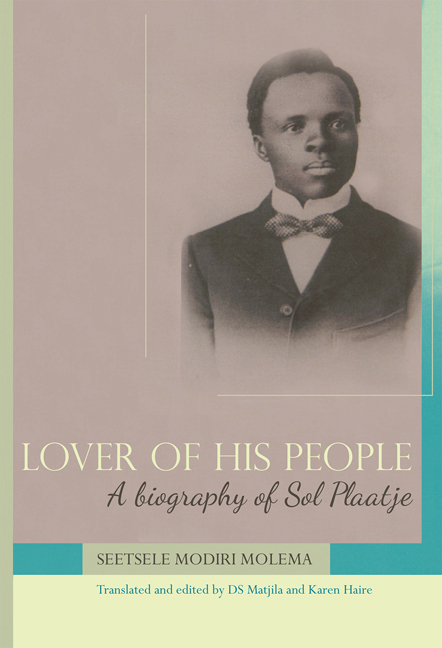Book contents
- Frontmatter
- Contents
- Acknowledgements
- Preface
- Foreword: Seetsele ModiriMolema: A star
- Chapter One First Encounter and Acquaintance
- Chapter Two Early Days and Youth
- Chapter Three An Unforgettable Year: 1896
- Chapter Four Life's Challenges
- Chapter Five Plaatje, The Career Journalist
- Chapter Six Government News
- Chapter Seven Conventions and Writings
- Chapter Eight Delegations and Meetings
- Chapter Nine Last Meetings and Travels
- Chapter Ten The Last Encounter
- Chapter Eleven Plaatje in His Own Words: English Extracts
- Chapter Twelve Plaatje in His Own Words: Setswana Extracts
- Seetsele Modiri Molema of the Mahikeng Molemas
- Bibliography
Chapter Nine - Last Meetings and Travels
Published online by Cambridge University Press: 16 March 2018
- Frontmatter
- Contents
- Acknowledgements
- Preface
- Foreword: Seetsele ModiriMolema: A star
- Chapter One First Encounter and Acquaintance
- Chapter Two Early Days and Youth
- Chapter Three An Unforgettable Year: 1896
- Chapter Four Life's Challenges
- Chapter Five Plaatje, The Career Journalist
- Chapter Six Government News
- Chapter Seven Conventions and Writings
- Chapter Eight Delegations and Meetings
- Chapter Nine Last Meetings and Travels
- Chapter Ten The Last Encounter
- Chapter Eleven Plaatje in His Own Words: English Extracts
- Chapter Twelve Plaatje in His Own Words: Setswana Extracts
- Seetsele Modiri Molema of the Mahikeng Molemas
- Bibliography
Summary
TRAVELS TO THE CONGO
In the winter of 1931 there was a huge international exhibition in the town of Elizabethville in the Katanga region of the Congo. This exhibition was funded by the Belgian, Belgian Congo, South African and Northern and Southern Rhodesian governments. With the assistance of the railways department here in South Africa, Plaatje was able to travel to the Congo to learn about the affairs and lives of the African people in that country. The colonisers of that country were the Belgians, and the language of instruction was French. Their literature was written in French.
On his return from the Congo,lx Plaatje addressed a large gathering, including many Europeans, in Bulawayo. The chief justice of Southern Rhodesia, Mr Justice Russell, who was also the chairman of the conference, introduced Plaatje with moving and heartfelt appreciation. He had lived in South Africa when he had been a member of the Cape Provincial Council and had known Plaatje since those days. Plaatje related how Africans in the Congo were still behind South Africans, especially in the standard of education, the size of their educational institutions and the number of schools serving a population of around twenty million. Nevertheless, African people in the Congo did jobs which were reserved for Europeans in South Africa. Some even managed the railways, while others were postmasters and gold-mine managers. Some were train drivers and others were stationmasters, or police commissioners and army generals. Even though African people in that country had been persecuted under the rule of King Leopold II of Belgium since around 1912, they were equal to Europeans before the law.
OUR HERITAGE AND THE INTERNATIONAL ORDER OF TRUE TEMPLARS
I am black but comely, O ye daughters of Jerusalem.
As the tents of Kedar, and the curtains of Solomon.
Look not upon me because I am black, because the sun hath looked upon me.
My mother's children were angry with me;
They made me keeper of the vineyards;
But mine own vineyard have I not kept.
All the newspapers and periodicals Plaatje edited carried these words – Plaatje's signature, if you will – from Koranta ea Becoana (1901-1909) to Tsala ea Batho (1910-1917), to Boswa jwa rona (Our Heritage) (1931-1932). Only Plaatje really knew the significance of these words. It was as if he was elevating the nations of Africa and celebrating black skin colour.
- Type
- Chapter
- Information
- Lover of his PeopleA biography of Sol Plaatje, pp. 80 - 85Publisher: Wits University PressPrint publication year: 2013



